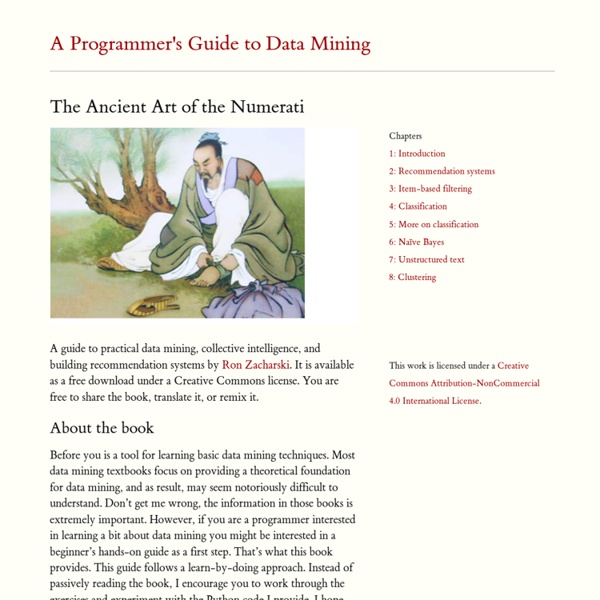



Academic Ranking of World Universities | ARWU | First World University Ranking | Shanghai Ranking Exploration de données Un article de Wikipédia, l'encyclopédie libre. Vous lisez un « bon article ». L'utilisation industrielle ou opérationnelle de ce savoir dans le monde professionnel permet de résoudre des problèmes très divers, allant de la gestion de la relation client à la maintenance préventive, en passant par la détection de fraudes ou encore l'optimisation de sites web. C'est aussi le mode de travail du journalisme de données[1]. L'exploration de données[2] fait suite, dans l'escalade de l'exploitation des données de l'entreprise, à l'informatique décisionnelle. Histoire[modifier | modifier le code] Collecter les données, les analyser et les présenter au client. De 1919 à 1925, Ronald Fisher met au point l'analyse de la variance comme outil pour son projet d'inférence statistique médicale. L'arrivée progressive des micro-ordinateurs permet de généraliser facilement ces méthodes bayésiennes sans grever les coûts. Applications industrielles[modifier | modifier le code]
Weka 3 - Data Mining with Open Source Machine Learning Software in Java Weka is a collection of machine learning algorithms for data mining tasks. It contains tools for data preparation, classification, regression, clustering, association rules mining, and visualization. Found only on the islands of New Zealand, the Weka is a flightless bird with an inquisitive nature. The name is pronounced like this, and the bird sounds like this. Weka is open source software issued under the GNU General Public License. We have put together several free online courses that teach machine learning and data mining using Weka. Weka supports deep learning!
Pseudonymization vs. Anonymization and How They Help With GDPR January 5, 2017 Pseudonymization and Anonymization are two distinct terms that are often confused in the data security world. With the advent of GDPR, it is important to understand the difference, since anonymized data and pseudonymized data fall under very different categories in the regulation. Pseudonymization and Anonymization are different in one key aspect. You can think about it in terms of authors. In practice, let’s look at tokenization. Here, with the pseudonymized data, we may not know the identity of the data subject, but we can correlate entries with specific subjects (records 1 and 7 reference the same person, records 2 and 5 reference the same person, records 3 and 4 reference the same person). Pseudonymization is a method to substitute identifiable data with a reversible, consistent value. With Anonymization, we must also be concerned about “indirect re-identification”. “50 people went to this coffee shop every morning.” “100 people got money from this ATM every Friday.”
How to Think Like a Computer Scientist Learning with Python by Allen Downey, Jeff Elkner and Chris Meyers. This book is now available for sale at Lulu.com. How to Think... is an introduction to programming using Python, one of the best languages for beginners. How to Think... is a Free Book available under the GNU Free Documentation License. Please send suggestions, corrections and comments about the book to feedback{at}thinkpython{dot}com. Download The book is available in a variety of electronic formats: Precompiled copies of the book are available in PDF and Postscript . Translations Here are some translations of the book into other (natural) languages: Spanish translation by Gregorio Inda. Other Free Books by Allen Downey are available from Green Tea Press. If you are using this book and would like to make a contribution to support my work, please consider making a donation toward my web hosting bill by clicking on the icon below.
the museum of science, art and human perception The R Project for Statistical Computing * Algorithm (Photography) - Definition - Lexicon & Encyclopedia AlgorithmAn algorithm describes a set procedure to complete a task in computing. It comprises the actions needed to complete a specific task, or for solving a specific problem. [>>>] How do algorithms listen to music?From copyright monitoring and cover song detection to classifications of all kinds (genre, style, mood, key, year, epoch), all the way to the music curation war waged by the music streaming titans, ... [>>>] Demosaicing Algorithms: Color FilteringPrev NEXTA more economical and practical way to record the primary colors is to permanently place a filter called a color filter array over each individual photosite. [>>>] The one clear thing about how the Instagram ~[⇑] works is that posts with high engagement rates show up first on users' feeds. [>>>] ~[⇑]s[edit]Simple interpolation[edit]These ~[⇑]s are examples of multivariate interpolation on a uniform grid, using relatively straightforward mathematical operations on nearby instances of the same color component. [>>>]
A Course in Machine Learning